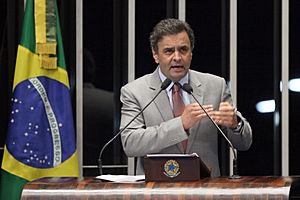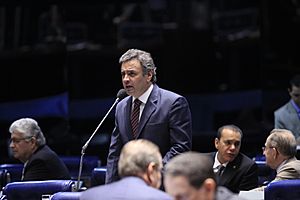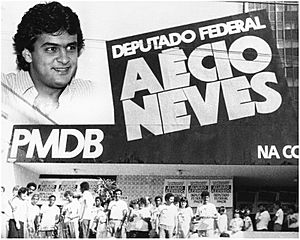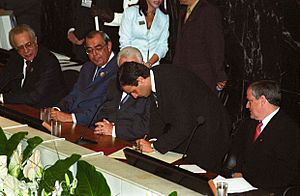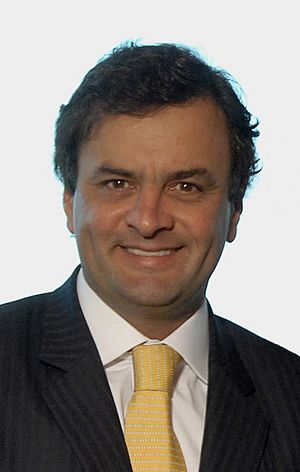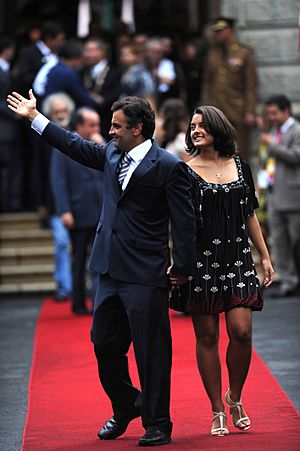Aécio Neves facts for kids
Quick facts for kids
Aécio Neves
|
|
|---|---|
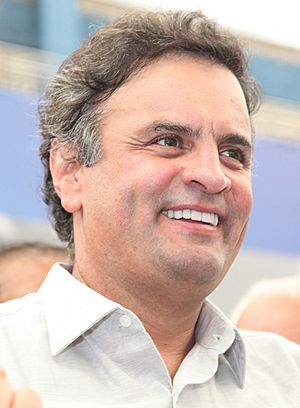
Neves in 2014
|
|
| Senator for Minas Gerais | |
| In office 1 February 2011 – 1 February 2019 |
|
| National President of the Brazilian Social Democracy Party | |
| In office 18 May 2013 – 18 May 2017 |
|
| Preceded by | Sérgio Guerra |
| Succeeded by | Tasso Jereissati (Acting) |
| Governor of Minas Gerais | |
| In office 1 January 2003 – 31 March 2010 |
|
| Vice Governor | Clésio Andrade (2003–07) Antônio Anastasia (2007–10) |
| Preceded by | Itamar Franco |
| Succeeded by | Antônio Anastasia |
| President of the Chamber of Deputies | |
| In office 14 February 2001 – 17 December 2002 |
|
| Preceded by | Michel Temer |
| Succeeded by | João Paulo Cunha |
| Federal Deputy for Minas Gerais | |
| Assumed office 1 February 2019 |
|
| In office 1 February 1987 – 17 December 2002 |
|
| Chair of the Chamber Foreign Affairs and National Defence Committee | |
| Assumed office 12 March 2021 |
|
| Preceded by | Eduardo Bolsonaro |
| Personal details | |
| Born |
Aécio Neves da Cunha
10 March 1960 Belo Horizonte, Minas Gerais, Brazil |
| Political party | PSDB (1988–present) |
| Other political affiliations |
PMDB (1980–88) |
| Spouses |
Andréa Falcão
(m. 1991; div. 1998)Letícia Weber
(m. 2013) |
| Children |
|
| Alma mater | Pontifical Catholic University of Minas Gerais (B.Ec.) |
Aécio Neves da Cunha (Brazilian Portuguese: [aˈɛsiw ˈnɛviz da ˈkũɲɐ]; born 10 March 1960) is a Brazilian economist, politician and former president of the Brazilian Social Democracy Party (PSDB). He was the 17th Governor of Minas Gerais from 1 January 2003 to 31 March 2010, and is currently a member of the Brazilian Chamber of Deputies. He lost in the runoff presidential election against Dilma Rousseff in 2014.
Contents
Biography
Born in Belo Horizonte in the state of Minas Gerais, Neves was the youngest governor in the state's history. He began his political career as a personal secretary of his grandfather, Tancredo Neves, who was elected President of Brazil in 1985, but died before taking office. Aécio Neves served the World Federation of Democratic Youth in 1985 and four terms as an elected deputy for the Brazilian Social Democracy Party in the Federal Chamber of Deputies from 1 February 1987 to 14 December 2002, representing Minas Gerais. He was also President of the Chamber of Deputies in 2001/02.
As governor, Aécio Neves introduced the "Management Shock", a set of sweeping reforms designed to bring the state budget under control by reducing government expenditure and promoting investment. Having been tipped as a potential candidate for the Brazilian Presidential elections in 2010, Neves announced his intention to stand aside from the race at the end of 2009. He ran for the Brazilian Federal Senate instead, and was elected a Senator representing the State of Minas Gerais. He took office as a Senator of the Republic on 1 February 2011.
Aécio was a columnist at Brazilian newspaper Folha de S.Paulo until June 2014. On 5 October 2014, he received the second largest number of votes (at 34%) in the Brazilian presidential election, placing him in the runoff election to be held on 26 October 2014, against the first place candidate and former Brazilian president, Dilma Rousseff, who received 42% of the votes.
Early years
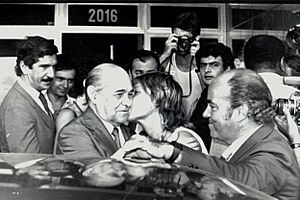
Aécio Neves is son of politician Aécio Cunha and Inês Maria. Neves hails from a family of traditional politicians in Minas Gerais. His maternal grandfather, Tancredo Neves, was a key figure in the re-democratization of Brazil, served as governor of Minas Gerais and elected via electoral college. Neves’ paternal grandfather, Tristão Ferreira da Cunha, and his father Aécio Cunha were congressmen representing the state of Minas Gerais. His paternal grandfather, Tristão Ferreira da Cunha, a native of Teófilo Otoni, a northern city in Minas Gerais, was also a politician as well as a lawyer and a professor. He was Secretary of Agriculture, Industry and Commerce in the state government of Juscelino Kubitschek (1951–1955). Aécio Cunha, son of Tristão and father of Aécio, was state deputy between 1955 and 1963 and federal representative between 1963 and 1987.
Neves moved to Rio de Janeiro with his parents when his was 10 years old. He had his first job at the Administrative Council for Economic Defense of the Ministry of Justice in Rio de Janeiro. In 1981 his maternal grandfather convinced Neves to return to Belo Horizonte. He moved into an apartment that he shared with his maternal grandfather and father and transferred to Pontifical Catholic University of Minas Gerais, where he studied economics.
In 1982 Aécio began working in his grandfather's campaign for the state government, attending meetings and rallies in more than 300 towns. Tancredo Neves was elected governor of Minas Gerais, and in 1983, Aécio served as his private secretary. In the following years, Aécio participated in the movement "Diretas Já" and in Tancredo Neves’ presidential campaign. Tancredo Neves won the Brazilian presidency via electoral college in 1985. After the elections Aécio Neves accompanied the president-elect on visits to democratic countries, a political strategy used to enhance the retransition to democracy in Brazil. They visited the United States and US President Ronald Reagan, France with President François Mitterrand, Italy and Sandro Pertini, Prime Minister Bettino Craxi, King Juan Carlos of Spain and Pope John Paul II. Aécio Neves was appointed Secretary of Special Affairs of the Presidency by President-elect Tancredo Neves, but due to his early death, and José Sarney assuming office the job was cancelled.
Congressman
In 1986 he ran for the National Constituent Assembly as a member of Brazilian Democratic Movement Party (PMDB). He received 236,019 votes, which at the time was the largest vote for a congressman elected from Minas Gerais. In the Constituent Assembly he became vice the chairman of the Sovereignty and Rights and Guarantees of Men and Women and was also one of the authors of the amendment that turned Brazil's voting age to 16 years.
In his second term (1991-1995) he voted for the impeachment of President Fernando Collor de Mello. In 1992 Aécio ran for mayor of Belo Horizonte, but was defeated. It was his only electoral defeat until his unsuccessful bid for the Presidency in 2014. Neves was reelected to Congress for a third term in 1994. The term lasted from 1995 to 1998, during which he was elected president of PSDB Minas Gerais. In 1997, he became PSDB's leader in Congress.
President of the Chamber of Deputies
In 2001 Neves was elected president of the Chamber of Deputies. He had run against Aloízio Mercadante (PT-SP), Inocêncio Oliveira (PFL-PE), Valdemar Costa Neto (PL-SP) and Nelson Marquezelli (PTB-SP) and received more votes than all his competitors combined. He serves as president of Congress from 14 February 2001 until 17 December 2002. As president of Congress he assumed, temporarily, the presidency of Brazil starting on 26 June 2001.
Under his leadership he promoted the so-called Ethical Package, a set of measures aimed at moralizing parliamentary action. Neves led the vote of the end of congressional immunity for common crimes, the establishment of a code of ethics and propriety and the Ethics Committee. He also provided the processing and votes of bills on the Internet so that the public could monitor the processing of the legislative process. He also cut congressional spending and sent saved money back to the federal government.
Senator
Neves, along with former President Itamar Franco, was elected senator on 3 October 2010 with 7,565,377 votes. Neves is a member of the Senate committees on political reform, constitutional affairs, justice and citizenship. He participated in the Economic Affairs Committee. As a parliamentarian Neves has advocated the development of a new federal pact, the strengthening of parliamentary action with the restriction on the use of provisional measures, the reduction of taxes and the change in the calculation used for payment of mining royalties.
On 18 May 2017, Neves was suspended from the position of Senator by Minister of the Supreme Court Edson Fachin, at the request of the Attorney General's office that also requested his arrest after the information that he requested R$2 million from the owners of meat processing company JBS. On 30 June 2017, Justice Marco Aurélio Mello authorized the return of Aécio to the Senate. On 26 September 2017, Judges Luís Roberto Barroso, Rosa Weber, and Luiz Fux suspended the Senator again. Vice-president of the Federal Senate, Senator Cássio Cunha Lima stated that he "believe[s] that the Senate will take down the decision of the Supreme Court", justifying that the decision of the Court turned the suspension of Aécio into a house arrest, which needs authorization of the Senate.
On 17 October 2017, Federal Senate voted 44 to 26 for the return of Senator Neves to his seat.
On 17 April 2018, the Supreme Court accepted a judicial complaint to investigate Neves for corruption and obstruction of justice after he was recorded requesting R$2 million from JBS and after his family members got the money.
Main achievements
Governor
On 6 October 2002 Neves was elected governor of Minas Gerais. On 28 March 2006, Aécio announced his candidacy and soon after was reelected, Neves became the second longest-serving governor in state history. The Government of Minas Gerais expropriated a piece of land owned by Neves's great-uncle, estimated at R$1 million. His great-uncle requested R$20 million for the indemnification. The State appealed the value in the Justice and the indemnification was annulled.
As governor he hired 98,000 public employees without any public selection and with allegedly illegal procedures. During his administration, the salaries of school teachers in Minas Gerais reached the lowest level of the whole country. The basic salary of medical doctors was R$1,050, the second lowest of the country.
.....
Social development
Among the social programs implemented by Aécio are the Project to Combat Rural Poverty (PCRP), developed with total funding of US$70 million, divided into two payments of US$35 million, from the World Bank. The project covers 188 municipalities in Northern Minas Gerais and some districts. The communities are responsible for organizing and defining its priorities. The projects range from the construction of kindergartens to the establishment of handicraft associations or fish farms.
Neves launched the Youth Savings Program in March 2007 with the goal to support 50,000 high school students from the state system who live in areas of high social risk by 2010. Every student received a sum of R$3,000 at the end of the third year of high school, which can be used in their professional career. To receive the money, the high school graduates must take a series of commitments on school performance, such as attendance, good grades, and personal behavior. They cannot, for example, engage in criminal activity and should perform community service. Over 30,000 students have participated in the program and have received English classes, computer skills and professional training.
Transportation
The Neves government created the Paving Program Links and Access Road program in 2004 with own resources and funding from the Interamerican Development Bank. The program included the paving of accesses to 225 municipalities that had previously been connected only by dirt roads.
Administrative City Tancredo Neves
Administrative City Tancredo Neves, built to be the new headquarters of State Government, was inaugurated by Neves on 4 March 2010, on what would have been Tancredo Neves’ 100th birthday. The set of five buildings was designed by Oscar Niemeyer and is located on the grounds of the former Hipódromo Serra Verde on the border of the municipalities of Belo Horizonte, Vespasiano and Santa Luzia.
Management Shock
One of the main points of Aécio's government is the so-called "Management Shock", a set of measures to make the government spend less on itself and invest more in people. In the long term, Management Shock seeks to reduce corruption and to improve the quality and productivity of state government bodies. The program also provides investment in the training of civil servants of the state.
In 2003, Neves created "Stay Alive", a program to reduce homicides in the state. Per year, 13,000 high-risk students and young adults from areas with the highest homicides throughout the state participate in the program. In the areas the program covers, homicide rates have dropped more than 50%. The program focuses on workshops on sport, culture, productive inclusion and communication to divert young people from crime.
On 21 January 2009, the state government inaugurated the "Reference Center for Pregnant Women in Jail", built in Vespasiano - MG. This is the first prison in the country to house pregnant inmates and their babies until they complete one year. Aécio launched the first prison in the country built and administered through a public-private partnership.
Candidacy for Presidency in 2014
In December 2012, former Brazilian president Fernando Henrique Cardoso appointed Aécio Neves as candidate of the Brazilian Social Democracy Party for the 2014 presidential elections. In the October 2014 election, Neves received the second greatest number of votes in the first round, defeating former Environment Minister Marina Silva. He narrowly lost in the second round, a run-off against incumbent Dilma Rousseff on 26 October 2014, 48.4% to Rousseff's 51.6%.
Personal life
Neves was born into a political family in the city of Belo Horizonte, capital of southeast Minas Gerais state, in 1960.
Neves married model Letícia Weber, from the state of Rio Grande do Sul, in 2013. They had twins, Bernardo and Julia, in September 2014. He has another daughter, Gabriela Falcão Neves, born in 1991 from his first marriage (1991-1998) with lawyer Andrea Falcão.
Andrea Neves, Aecio's sister, was arrested by the Federal Police in Brumadinho, in the Metropolitan Region of Belo Horizonte. Andrea Neves was arrested on suspicion that she had asked for money from businessman, Joesley Batista, on behalf of her brother. Frederico Pacheco de Medeiros, cousin of Senator Aécio Neves, was also arrested in Nova Lima, being that he was responsible for receiving the requested money from Joesley Batista.
Elections
| Year | Election | Party | Office | Coalition | Partners | Party | Votes | % | Result | Ref. | ||
|---|---|---|---|---|---|---|---|---|---|---|---|---|
| 1986 | State Elections in Minas Gerais | PMDB | Federal Deputy | None | 236,019 | - | Elected | |||||
| 1990 | PSDB | None | 42,412 | - | Elected | |||||||
| 1994 | None | 105,385 | 2.17% | Elected | ||||||||
| 1998 | None | 185,051 | 2.57% | Elected | ||||||||
| 2002 | Governor | United Minas
(PSDB, PFL, PPB, PV, PSL, PTN, PAN, PRTB, PHS) |
Clésio Andrade | PFL | 5,282,043 | 57.68% | Elected | |||||
| 2006 | Governor | Minas Cannot Stop
(PSDB, PFL, PP, PL, PSB, PTB, PPS, PSC, PAN, PHS) |
Antonio Anastasia | PSDB | 7,482,809 | 77.03% | Elected | |||||
| 2010 | Senator | We are Minas Gerais
(PSDB, PP, DEM, PR, PSB, PDT, PTB, PPS, PSC, PMN, PSDC, PSL) |
Elmiro Nascimento | DEM | 7,565,377 | 39.47% | Elected | |||||
| Tilden Santiago | PSB | |||||||||||
| 2014 | Brazilian Presidential Election | President | Change Brazil
(PSDB, SD, PMN, PEN, PTN, PTC, DEM, PTdoB, PTB) |
Aloysio Nunes | PSDB | 34,897,211 | 33.55% | Second Round | ||||
| 51,041,155 | 48.36% | Lost | ||||||||||
| 2018 | State Elections in Minas Gerais | Federal Deputy | None | 106,702 | 1.08% | Elected | ||||||
| 2022 | None | 85,341 | 0.76% | Elected | ||||||||
See also
 In Spanish: Aécio Neves para niños
In Spanish: Aécio Neves para niños


